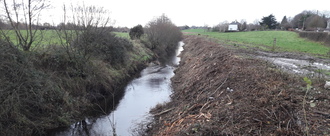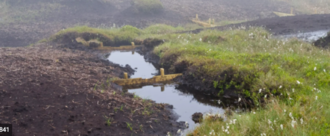- Featured
- Animal Rights
- Anti-racism
- Arts & Culture
- Children
- Climate
- Corporate accountability
- Crime
- Disability rights
- Economic
- Education
- Environment
- Food and Sustainable Production
- Gender Equality
- Governance and Transparency
- Health
- Housing
- LGBT Rights
- Mental health
- Northern Ireland
- Planning
- Privacy and Data Protection
- Rural Inequality
- Social Justice
- Trade
- Transport and Infrastructure
- Workers' Rights
- More
-
Reform the Arterial Drainage ActThe Office of Public Works (OPW) is mandated under the Arterial Drainage Act 1945 to 'maintain' over 11,000km of river channel in Ireland - something that has resulted in the destruction of whole river systems. We need a new law that is fit to address the biodiversity and climate crisis and that works with - and for - people and nature.5,521 of 6,000 SignaturesCreated by Padraic Fogarty

-
Support an ambitious Climate Change Act for Northern Ireland #ClimateActNowOver ten years has passed since the UK Climate Change Act was passed and there is still no Northern Ireland specific Climate Change legislation. Northern Ireland is lagging behind, urgent and ambitious action is now required. As proposed in the cross-party Private Members Bill, we demand that a Northern Ireland Climate Act must include: - an overarching target to achieve net zero greenhouse gas emissions in Northern Ireland by 2045 - interim emissions reduction targets - a duty on government to bring forward a Climate Action Plan with sectoral targets and relevant policies/programmes and clear carbon budgets for each sector (to be laid before the NI Assembly within three years) - a duty on government to establish an independent monitoring and oversight body1,679 of 2,000 SignaturesCreated by Climate Coalition Northern Ireland
-
TCD: Hold a Climate Assembly and ReferendumThe Mobilise Peace campaign is reaching out to universities across Ireland, the UK and globally in a peaceful and escalating campaign calling for them to support, encourage and prepare their student, alumni and staff populations for national peaceful civil disobedience. Our global climate and ecological systems are in a state of severe crisis. Our economic system, which demands infinite growth on a planet of finite resources, is largely to blame for the above crises. Furthermore it inflicts untold suffering on defenceless others here, and around the world in numerous other ways. [1] There are many peaceful, positive practical, and powerful alternatives to our current system. These alternatives should be decided by a citizens' assembly. Governments worldwide have proven themselves to be either unwilling or dilatory to implement the changes needed. New climate models to be published in 2021 predict heating of +5C by the end of the century, translating to as much as +10C over land. [2] For perspective, 2-3 degrees of warming will result in 2 billion climate refugees by 2100. [3, 4] Through 2050 net zero targets, inordinately high per capita emissions, and raised border policies, our national and EU governments are taking a trajectory consistent with climate genocide of the Global South. There is a great injustice occurring and there is strong reason to believe that policies, laws and lawful recourse to changing them will not work. Peaceful civil disobedience may thus present the best option and possibly last hope we have of bringing about positive societal change. [5, 6] The fastest way to rapidly change a society is through non-violent civil disobedience. This has been demonstrated time and time again throughout history — the Suffragettes, the Civil Rights Movement, resistance to apartheid in South Africa and the fight for India's independence from British rule. [6] References: 1. Sachs et al., 2020, Letter from economists: to rebuild our world, we must end the carbon economy The Guardian 2. Voosen, P., 2019. New climate models predict a warming surge. Science, pp.Science, 04/17/2019. 3. Vince, G. 2019 The heat is on over the climate crisis. Only radical measures will work. The Guardian 4. Xu et al., 2020, Future of the human climate niche, PNAS, 117, 11350 5. Lemons, J. & Brown, D., 2011. Global climate change and non-violent civil disobedience. Ethics in Science and Environmental Politics, 111, pp.312. 6. Chenoweth, E., &; Stephan, M. 2011. Why Civil Resistance Works: The Strategic Logic of Nonviolent Conflict Columbia University Press. fb.me/mobilisepeace fb.me/scientistrebellion fb.me/systemchangeinternational148 of 200 SignaturesCreated by Zac Lumley

-
Stop Peat Removal at Lough NeaghMcCann Bros are consulting on their proposals to carry out peat extraction on the shores of Lough Neagh. This should be stopped because: - This beautiful bogland is a finite resource, vital for wildlife and as a carbon sink. Contrary to the consultation the extraction will not be 'temporary' and to say so is a gross misrepresentation of the application. You cannot temporarily dig out a bog – when its gone its gone. - The proposal flies in the face of the Strategic Planning Policy Statement which protects peatlands. - This peatland is within an Area of Constraint on Minerals and within the Lough Neagh Ramsar site which means it is a wetland of international importance – this rich nature reserve should not and cannot be mined for horticultural peat that no gardener needs. - A two week consultation that finishes on New Years Eve at a time of Christmas and Covid is a cynical abuse of the planning system.1,211 of 2,000 SignaturesCreated by Nicola Browne
-
Ag fas le cheile! Say yes to a 100 % Organic, Chemical-free and GMO-free IrelandDear Friends, I just created the petition: Ag fas le cheile! Say yes to a 100% Organic, 100% Chemical-free and 100% GMO-free Ireland. It would mean a lot to me if you took a moment to add your name because: A journey’s end matters not, for it is the journey itself that inspires, enriches and delights. As I took “the road less travelled” 18 months ago, I could not have imagined the amount of learning to be had on this road; for I am now less dependent on certain modern conveniences than I was in May 2019. Now in November 2020, I am • 100% shampoo-free • 100% clothes detergent-free • 100% washing-up liquid free • 100% dishwasher liquid free • 100% all-purpose cleaner free • 99% bin-free. In short, grey water that leaves my house is virtually chemical free with a minimal toxic load to the environment. My garden is 100% Organic, 100% Chemical-free and 100% GMO-free and has been for about 10 years. With the continued support from local Clare businesses and shops, Clare media and a waste prevention grant from Clare County Council, Operation de-Plastification with its “slim your bin or bin your bin challenge” has been able to inform, encourage, support and lead-by-example on the quest to waste reduction, particularly plastic related waste in the shape of single-use plastic bottles and plastic packaging. With the submission to Clare County Council for the Clare Local Development Plan 2022 – 2028 "100% Organic, 100% Chemical-free and 100% GMO-free", I am hoping to sow the seed for a different Clare, and by extension a different Ireland, to highlight a path that has been taken by other countries successfully and to encourage as many people of all ages and guises, including businesses and politicians, to re-think their habits and attitudes in relation to • everyday conveniences • everyday routines • everyday practices to aid the recovery of our planet, with an intact environment which in turn will support our future. The attempt to combine the Operation de-Plastification campaign and the vision for a post-pandemic County Clare, has generated the “ag fás le chéile” petition, where shoppers, sellers and consumers can voice, with their signature, their request for an enduring “green” Ireland. The petition aims to address all people living in Ireland: • Shoppers: we want to buy local, sustainable, affordable, nutritious, delicious, organic, plastic-packaging-free, chemical-free and gmo-free goods • Sellers: we want to sell local, sustainable, affordable, nutritious, delicious, organic, plastic-packaging-free, chemical-free and gmo-free goods • Consumers: we want to enjoy local, sustainable, affordable, nutritious, delicious, organic, plastic-packaging-free, chemical-free and gmo-free goods Assuring our environment’s and our survival, “the road not taken” may lead to a life and life-style where less is more, as less is more than enough in my experience. With the kindest regards, Cornelia Wahli Operation de-Plastification Campaign Slim your Bin or Bin your Bin Challenge “Ag fás le chéile” Petition ____________________________________________________________________ https://my.uplift.ie/petitions/ag-fas-le-cheile-say-yes-to-a-100-organic-chemical-free-and-gmo-free-ireland Real change happens when everyday people like you and I come together and stand up for what we believe in. Together we can reach lots of people and help create change around this important issue. After you've signed the petition, could you also take a moment to share it with others? It's really easy – all you need to do is forward this email. Thank you!75 of 100 SignaturesCreated by cornelia wahli
-
SAVE MOUNT LEINSTER FROM INDUSTRIAL DEVELOPMENTCoillte proposes to build 7 colossal wind turbines on the slopes of Mt Leinster, adjacent to a Special Area of Conservation. With a proposed height of 178m, significantly higher than any existing turbine in the region, this scale is normally placed offshore. There has been inadequate public consultation about this wind farm proposal and the majority of the local community are unaware of it. As local representatives, we urge you to safeguard this visually sensitive and ecologically valuable area and to protect our natural heritage for future generations. We appeal to you to collaborate in order to save Mt Leinster and the Blackstairs by taking the following measures: 1. Suspend the current windfarm planning application process until circumstances allow for appropriate public consultation. Coillte’s planning strategy has deprived the local and wider community of their right to engage in meaningful participation. 2. Introduce an immediate moratorium on new wind farm developments pending updating of the outdated 2006 national wind energy guidelines. 3. Strengthen County Carlow’s Wind Energy Strategy (WES) by making Mt Leinster and The Blackstairs a “No Go” area for windfarm development and industrialisation of any sort. 4. Strengthen legislation to protect our biodiversity and our Special Areas of Conservation (SACs). 5. Protect and preserve our wild places. • This proposed windfarm would destroy the Mt Leinster region and have a hugely negative impact on local tourism. Mt Leinster attracts locals and visitors from all over the country to its mountain wilderness. They engage in all sorts of activities from strolling along the beautiful country lanes in the unspoilt rural foothills of south County Carlow, to hillwalking, mountain biking, paragliding, kite flying, eco trailing, foraging and birdwatching. - The proposed turbines would be directly in front of the Nine Stones, a designated protected viewing point. The wonderful panoramic vista that currently greets visitors would be replaced by the sight, sound and flicker shadow of these massive industrial turbines, which would totally dominate the landscape. - The turbines would be seen from many scenic trails in Ireland’s Ancient East including The South Leinster Way, The Mount Leinster Heritage Drive, The Sky Road and newly launched Turas Columbanus part of the Europe-wide Columban Way. • With the exception of a small group of local landowners who were briefed in Oct 2019, there has been no public consultation by Coillte. Notwithstanding Covid 19 restrictions, there was no dissemination of information by any means for over a year. - An online information site about the proposed windfarm only went live at the end of Nov 2020 - see www.croaghaunwindfarm.ie approximately 9 days before the planning process began. - The distribution of an information brochure, only circulated in the first week of Dec 2020, was limited to houses within 2km of the proposed windfarm. • Of additional concern is the proposed access route for transport of building materials from Bunclody to Mt Leinster. This route runs through an area of outstanding natural beauty comprising narrow country roads, lined with ancient hedgerows and granite stone walls. They represent a rapidly vanishing aspect of our built and natural heritage. Once destroyed they can never be replaced. Coillte state that they will “temporarily upgrade” this road in order to facilitate transport of oversize loads, which would include 110M columns and 65M rotor blades. • The windfarm would also have a detrimental ecological impact. The Blackstairs contains a vast SAC, a designation which protects endangered habitats and biodiversity. The proposed windfarm site is just 400M from this SAC boundary. Only 13% of Ireland has SAC status. In this time of biodiversity crisis it is profoundly ecologically unsound to build an industrial wind farm so close to an SAC. - The proposed construction site is partly comprised of blanket bog. The recent catastrophic bogslide in Donegal demonstrates the devastating environmental destruction wreaked by inappropriate windfarm planning on bogland. • The new climate emergency bill has identified offshore wind energy as the most efficient solution to Ireland’s climate crisis. Our government has committed to the rapid development of this technology early next year. - It makes no sense to put gigantic and environmentally destructive wind turbines on land in one of the most scenic parts of Ireland when a much more efficient and environmentally sensitive technology will be available offshore in the near future. • Carlow’s WES describes the Mt Leinster/ Blackstairs region as unsuitable for windfarm development because of its value for tourism, the high quality of its scenery and the sensitivity of its landscape. - This same strategy states that Mt Leinster and 14 other areas across the Blackstairs are still “open for consideration” for windfarm development. - This anomaly needs to be addressed - if planning permission is granted for this windfarm it will set a precedent and create the potential for the proliferation of windfarms throughout The Blackstairs. • Currently there are very few wind turbines on the Carlow Blackstairs, but the NW corner of the Wexford Blackstairs is saturated with them. - Wexford’s WES has responded to this by making the Wexford Blackstairs a “ No Go area" for windfarms. - Can Carlow County Council collaborate with Wexford County Council and treat The Blackstairs mountain range as a single entity and protect it accordingly? • Mt Leinster and the Blackstairs have escaped the industrialisation that has blighted so many other parts of rural Ireland. Wild unspoilt places are few and far between. Once lost they are gone forever.3,651 of 4,000 SignaturesCreated by The Blackstairs and Barrow Valley Network .

-
Fix Ireland's Climate Bill 2020! #FixTheBillIn 2020, Climate Case Ireland took the Government to the Supreme Court for failing to act on climate change - and won. However, the fight for climate justice isn’t over. Ireland’s Climate Bill 2020 threatens to undermine the impact of the Supreme Court’s landmark judgment in Climate Case Ireland and creates a legal framework so weak as to be incapable of enabling the urgent action needed. The Climate Bill must be revised to protect the historic Supreme Court judgment and ensure that Ireland finally adopts legislation which has climate justice, a just transition, and a clear commitment to remaining below +1.5°C as its central organizing principles. Sign your name to let the Government know they must fix Ireland’s Climate Bill! #FixThe Bill 1. Learn from Climate Case Ireland: Climate Case Ireland successfully challenged the Government’s 2017 National Mitigation Plan on the basis that the Government had failed to specify how it would achieve the objective of the original 2015 Climate Act within section 4(2)(a). The re-drafted 2020 Climate Bill makes changes to reduce accountability such as: a. Removing and replacing section 4(2)(a) of the Act. To preserve the effect of the Supreme Court's judgment, section 4(7), as inserted by the Bill, should be deleted or amended to be "without prejudice" to section 4(6); b. Requiring the government only to “pursue” the 2050 goal rather than “pursue and achieve”; the latter was the phrase used in the 2015 Act and in the previous Government’s 2019 Heads of Bill; c. Use of weak, permissive language to reduce legal accountability, such as “have regard to” and “in the opinion of the Government/Minister”; d. The Bill no longer refers to achieving an “environmentally sustainable economy”. This should be reinstated. 2. A 2030 Target: The National Climate Objective should reflect an explicit commitment to complete decarbonisation (not “net-zero”)* by 2030 at the very latest and an equitable and scientifically sound commitment to remaining below +1.5C (*zero energy emissions combined with nature-based solutions that enhance biodiversity to sequester carbon from sectors where some emissions remain inevitable). The Bill should include a ratchet mechanism empowering the Minister to bring forward the decarbonisation year and interim targets, which are needed in the Bill. 3. Climate Justice and Just Transition: Decarbonising Ireland’s economy in a decade will not be easy. The principles of climate justice and just transition should be defined and should include the principle of a progressive distribution of the financial burden of climate mitigation and adaptation measures. These must be the central organizing principles of the Bill, with clear accountability mechanisms. 4. Reliance on undeveloped and untested technologies: The Bill should aim for complete decarbonisation by 2030, rather than a ‘climate neutral economy’ – the Bill currently implies large-scale use of unproven CO2 “removal” technologies. 5. Interim targets: The Bill’s carbon budgets should be pegged to interim targets that will put Ireland on a pathway to a decarbonisation target year of 2030. 6. 7% not enough: The Programme for Government commitment to reduce emissions by 7% a year on average over the next decade is not enough to make a fair share contribution to keeping global temperature rise below +1.5°C. 7. Strengthen language: The requirement to ‘have regard to’ should be strengthened to ‘consistent with’ in relation to: a. The objective of the UNFCCC and the temperature limits specified in the Paris Agreement b. Fulfilling the principles of climate justice and just transition; c. Fulfilling the objectives of the National Biodiversity Action Plan and the Aarhus Convention. 8. Legal accountability needs to be built in throughout the Bill: Carbon budgets should be legally binding, and all activities undertaken by public bodies, Government departments and private industry should be consistent with the carbon budgets. Failure to remain within the carbon budget limit should be met with clear sanctions. 9. Obligations on public bodies: all public bodies should be required to carry out their duties in a manner ‘consistent with’ the temperature limits and principles of the Paris Agreement. 10. Reparations: Financing emissions reductions efforts overseas alongside the provision of technological support should be viewed as reparations for harms done due to climate change under the Loss and Damage mechanism. 11. Include emissions from international aviation and shipping. 12. Impact assessment and reporting: All plans, projects and programmes should be assessed for their full climate impacts including non-territorial emissions. The EPA should be tasked with monitoring and reporting on “consumption emissions” in addition to territorial emissions. 13. Fossil fuel infrastructure and fracked gas: The construction of new fossil fuel infrastructure and the re-permitting of existing infrastructure should be prohibited by the Bill, including for example liquefied natural gas (LNG) terminals and gas-fired power plants and storage facilities. We also call for the insertion into the Bill of a section amending the Petroleum and Other Minerals Development Act 1960 to prohibit the importation or sale of fracked gas. 14. Actively disseminate information on the functions of public bodies under the Bill & guarantee public participation. 15. Provisions relating to the Climate Change Advisory Council should be amended to: a. Replace voting ex-officio members with independent experts in industrial relations, law and social justice b. Ensure the Council is adequately resourced, gender balanced, and inclusive of directly affected interests (eg youth and migrants from worst impacted nations), c. Be tasked with regular reporting on whether current policies and plans represent “progression” and Ireland’s “highest possible ambition” (Paris Agreement).2,168 of 3,000 SignaturesCreated by Climate Case Ireland

-
Stop Unsustainable Fishing in Irish Inshore WatersIn 2018 the Irish government implemented a ban on trawlers greater than 18m to fish within 6 nautical miles of the Irish coast. The High Court has since overturned this ban with the current law now allowing boats of any size to fish anywhere with no regulations or quotas enforced. Not only is this detrimental to inshore ecosystems, smaller Irish fishing communities cannot compete with large unregulated trawlers coming inshore. Bantry Bay in West Cork is one particular area that is currently at the detriment of unsustainable fishing practices. Although Bantry Bay is a designated Special Area of Conservation (SAC), drone footage of pair trawling was captured here in October 2020. This area is home to marine invertebrates, fishes, elasmobranchs, seabirds and marine mammals. While pair trawlers are fishing legally, with no regulations or quotas, they are fishing at an unsustainable rate and removing a critical food source (sprat and herring) for many larger marine species. Additionally, 80% of Irish fishing vessels are less than 12m and cannot compete with large trawlers. We need the Irish government to support small Irish fishing communities and protect our marine environment and its inhabitants. The Minister of Agriculture, Food and Marine , Charlie McConalogue has recently lodged an appeal against the High Court’s decision to allow large trawlers to fish within 6 nautical miles of the Irish coast. We call on the High Court to reinstate this ban on trawlers greater than 18m to fish within 6 nautical miles of the Irish coast.204 of 300 SignaturesCreated by ORCA Ireland Ocean Research & Conservation Association

-
Preserve and Restore Lovers Lane Ródán, CarndonaghAt a time where 'connection' has become so important as we have all reflected on the effects of this pandemic on our families and communities, we must stand to oppose the wilful damage to our local folk-history heritage sites and preserve these for the future. The restoration, preservation and reopening of the 'Ródán' known as 'Lovers Lane' should not be a political matter...it is a necessary action to protect the living history and shared heritage for our community. 'Lovers Lane' is recorded as a public right of way on OS maps dating to the 1800's and is likely to be much older than this. There is a strong local folklore history connected to this site which is currently in the process of being ripped out by bulldozers by a local construction firm in the name of development. The planning documents show no permissions to interfere, damage or indeed close this public right of way...no public notification has been made to announce the closure of this public pathway which is heavily used by walkers, who now, due to the illegal closure and damage to the pathway, have to walk across a newly opened construction site entrance (which there is no planning permission for) along a busy narrow road and onto a major artery road, putting the public in harms way. We, the undersigned community of Carndonagh insist on the cessation of damage, the restoration to it's original state for preservation and the immediate reopening of the Ródán 'Lovers Lane' in Carndonagh, Co. Donegal.671 of 800 SignaturesCreated by Sinead Smyth
-
Better lighting in Phoenix ParkFor years Phoenix Park has been providing a place for exercise and fresh air but has never been fully utilised during the winter months due to poor lighting.In these winter months, people have a right to use and feel safe in their parks. This is especially important during Covid restrictions when indoor facilities are closed. Many of us have other responsbilities such as work, caring, school etc during day light hours. The lack of lighting in the park means people feel unsafe going to get the exercise needed for our mental and physical health. We want the OPW to enable the public make use of the park, even during dark evenings. Additional lighting could be installed for limited periods along the main road, helping people stroll, walk or run safely throughout the winter months.682 of 800 SignaturesCreated by Cllr. Darcy Lonergan
-
One Stamp for All Spouse and Dependents Immigrants #Equal Rights IrelandImmigrants spouses are being treated and marked as herds by giving them stamp 3/1g, making it impossible for them to access the job market. What are the spouses being punished for?? It is causing mental and health deterioration for the skilled immigrants who are suffering financially by being dependent on spouses. Isolation during covid-19 is building up some serious mental concerns as depression and suicidal thoughts. Furthermore adding to the misery of immigrants, stamp 1g is given to the graduates on job search and spouses of CSEP holders and hosting agreement holders. Recruiters are not willing to entertain anyone on Stamp 1g or stamp 3. Now with many of them listing an eligibility criteria as EU/Stamp 4 holder only may apply. Immigrants' spouses who have stamp 1g or stamp 3 are as if they are handcuffed for a crime which is simply being a dependent to a permit holder or critical skill worker. Dependent immigrants want to work and equally contribute to the society and pay taxes.58 of 100 SignaturesCreated by Aysha Mazhar
-
Paperless Offices45% of office printouts end up in the trash every day! The Environmental Paper Network reports that over the past 50 years, there’s been a four-fold increase in global consumption of paper. Despite the fact, that we live in the era of digitizationand have all the tools we need to make paperless offices a real thing, our love affair with paper has continued and there is no sign that this madness will end soon. But it should end now, because that's what the people want: 89% of Gen Zers said they are concerned about the planet’s health, and of this, 94% were of the view that businesses should help address urgent issues. And they are right! Climate change isn't only caused by diesel engines and coal-fired power plants. It's a challenge we all have to face together, both the industry and the people. In 2020, the year COVID-19 forced us to install digital workplaces across the globe, which are here to stay! In fact, BCG’s recent Workplace of the Future employer survey found that companies expect about 40% of their employees to follow a remote-working model in the future. That being said, it is an ideal time to rethink how many unnecessary copies of documents, customer orders, approval forms, and emails are printed each day.. (Source 1: https://www.myhubintranet.com/paper-saving-tips-12-ways/) (Source 2: https://environmentalpaper.org/) (Source 3: https://www.bcg.com/publications/2020/remote-work-works-so-where-do-we-go-from-here)6 of 100 SignaturesCreated by Erika Taylor







.png)




